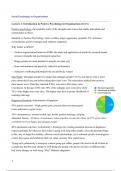Social Psychology in Organisations
Lecture 1: Introduction & Positive Psychology in Organisations (11/11)
Positive psychology: the scientific study of the strengths and virtues that enable individuals and
communities to thrive
Standard vs Positive Psychology: stress, conflict, anger, aggression, prejudice VS. resilience,
reconciliation, positive interpersonal relations, happiness
Why bother in SPinO?
- Positive organizational behavior (POB): the study and application of positively oriented human
resource strengths and psychological capacities
- Happy people are more productive (maybe, not sure yet)
- Hope and optimism are positively related to performance
- Subjective wellbeing and productivity are positively related
Nun Study: ‘Do happy people live longer than unhappy people?’ Every nun had to write a short
piece about their lives just before taking their final vows. The researchers marked how positive
these pieces were. Then they checked if they were alive after many years.
Conclusion: At the age of 90, only 30% of the unhappy ones were alive while Set point (genetic)
intentional activities
70% of the happy ones were alive. The happy ones have a greater likelihood of circumstances
reaching older age.
%10
Happiness Research: determinants of happiness
50% genetic set point: - High genetic part, research done on monozygotic %50
%40
twins and hetero-zygotic twins
10% circumstances: income/wealth, age, health, gender, marriage, religion,
education, beauty. ‘All these circumstances taken together account for about 10-15% of the total
variability between happy and unhappy people’
40% intentional activities: Lyubomirsky’s Strategies for creating sustained increase in happiness:
express gratitude for what you have/what is going well, help other people, savor the pleasant things
in life, stay in shape/live healthy, cultivate social relationships, try to rebound quickly from negative
events, have goals and ambitions that you value, increase flow experiences.
Trying out Lyubomirsky’s strategies: control group got sadder, people who had to do all of them in
a single day had the most change in well-being and people who had to do them on different days
had lower changes in well-being. Why? Hedonic adaptation.
1
,Hedonic adaptation: When you do something every day, you get used to it, it becomes a habit which
makes you less happy.
Changes in intentional activity tend to be less affected by hedonic adaptation than changes in
circumstances. 1. Intentional activity is episodic, 2. It can be varied, 3. Can directly counteract
adaptation to circumstances.
How to be happy according to positive psychology?
1. Do new activities rather than change circumstances
2. Vary
3. Fit between activity and values
4. Appreciate but not too often
5. Take part in activities that give you ‘flow’
Flow: the experience of complete absorption in the present moment, usually something you really
like, intrinsic, it doesn’t have to be anything positive. Strategy for identifying flow experiences:
‘Wow is it already 12.00???? I did not notice!’
Conditions needed to enter a ‘flow’ state: challenges that stretch but do not overstretch existing
skills; clear, proximal goals; immediate feedback about progress
*TAKE THE GRAPH FROM LECTURE SLIDES*
Nine characteristics of flow:
- clear goals
- Unambiguous and immediate feedback
- Skills that just match challenges
- Merging of action and awareness
- Centering of attention on a limited stimulus field
- A sense of potential control
- A loss of self consciousness
- An altered sense of time
- An autotelic experience —> Rewarding activity in itself
But.. people vary widely in their experience of flow, even if skills are equal. What is going on? Is
there an ‘autotelic personality’? And how to measure flow?
How to measure/investigate flow?
2
, - Questionnaires: after the fact, frequency and which activities
- Experience Sampling Method (ESM): participants fill in questionnaire at preprogrammed
moments during the day
- Objective measurement/observations
- Physiological measurements (cortisol)
- Experimental manipulation.
Future directions: application of Flow interventions (in educational contexts, therapy, at work), flow
in unwanted areas?
Resilience: the ability to bounce back from negative events, how do you recover from negative
events that happened?
Seery (2011): They measured how your life has been, global distress, functional impairment, life
satisfaction, PTS symptoms. Conclusion: If you have no lifetime adversity (you experienced
nothing, happy life so far), you are relatively unhappy = if you have high lifetime adversity (yoıu
went through a lot). Those who have average lifetime adversity they are relatively more happy.
When you have average global distress, you are better in recovering —> if it doesn’t kill you, it will
make you stronger.
Self compassion: being open to and aware of one’s own suffering, offering kindness and
understanding towards oneself. Not about increasing self-esteem but connecting to other people and
being kind with yourself.
3 elements of self compassion (Dr. Kristen Neff):
1. Self-kindness: understanding, not punishment —> Don’t call yourself names for ex.
2. Sense of common humanity: everybody goes through this
3. Mindfulness: neither ignoring nor exaggerating feelings of failure —> It’s bad yes but not the
end of the world.
Self compassion and academic achievement:
Mastery orientation: motivated by curiosity, desire to develop skills and understand new material,
make effort attributions.
Performance orientation: motivated to defend pr enhance their sense of self-worth, make ability
attributions for success and failure, evaluate their ability via social comparisons
Mastery orientation (compared to performance orientation) is linked to higher levels of intrinsic
motivation, greater effort and persistency.
3





